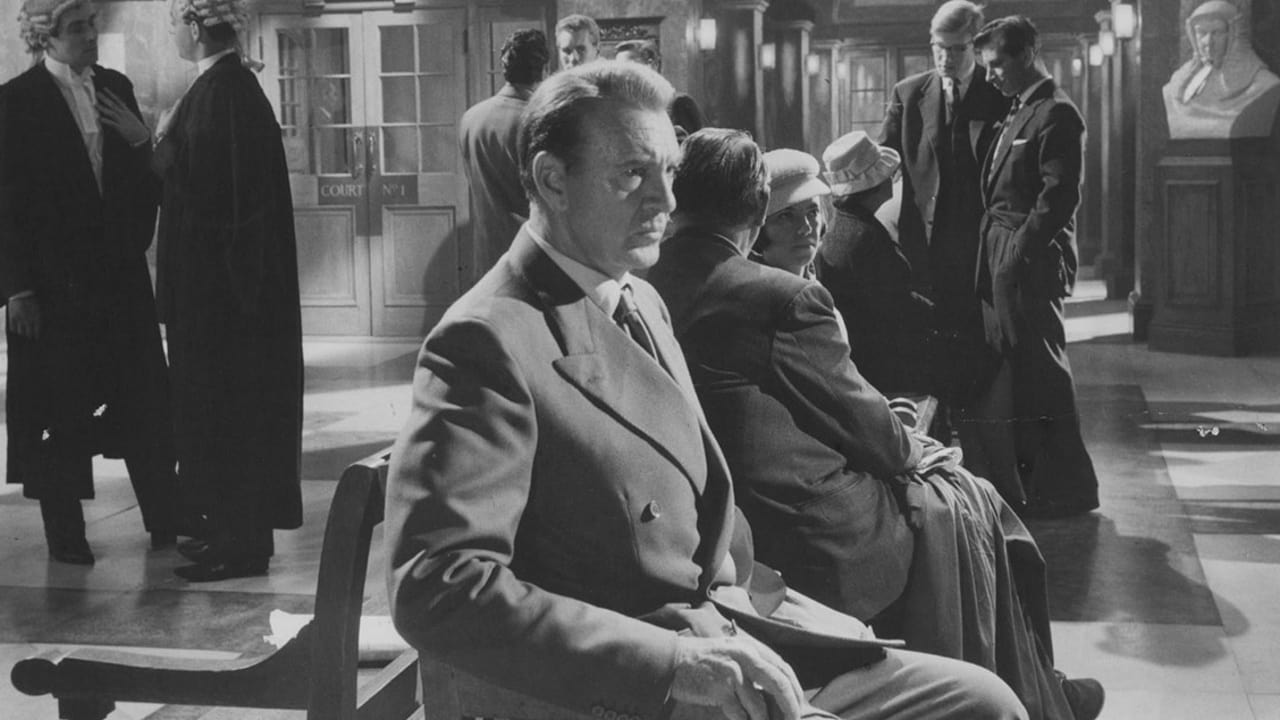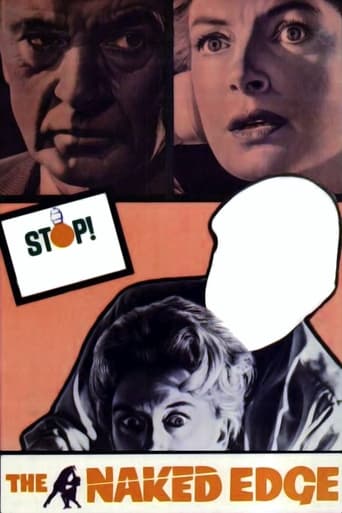

Crappy film
... View MoreIt's a mild crowd pleaser for people who are exhausted by blockbusters.
... View MoreThe film never slows down or bores, plunging from one harrowing sequence to the next.
... View MoreWhile it is a pity that the story wasn't told with more visual finesse, this is trivial compared to our real-world problems. It takes a good movie to put that into perspective.
... View MoreThe Naked Edge is directed by Michael Anderson, has a screenplay by Joseph Stefano which is based on the novel by Max Ehrlich. The film stars Gary Cooper, Deborah Kerr, Diane Cilento, Ray McAnally, Peter Cushing and Eric Portman.This is a cracking thriller, filled with plenty of tension and good performances. The film struck me as being very similar to Hitchcock's Suspicion, focusing on the wife beginning to doubt her husband and fear for own safety a little.George Radcliffe(Gary Cooper)witnesses a murder and robbery. Donald Heath(Ray McAnally)is arrested for the crime, he strongly insists that he is innocent but at the end of the trial he is found guilty and sent to prison.Some time later Radcliffe's wife Martha(Deborah Kerr)receives a blackmail letter which claims George was the killer. Martha slowly finds herself beginning to doubt her husbands innocence and becomes frightened of him.George says he is innocent and is hurt that she could doubt him. Martha tries to get to truth and even meets the blackmailer(a sinister performance by Eric Portman)to try and get to the truth. Up until the final scene we're not sure just how innocent or guilty George is and that adds to the suspense and tension the film builds up. Cooper plays the character in a way that you can see guilt if you look for it, you can also see innocence too and you're never entirely sure what to make of him.Cooper and Kerr are excellent, I think it's a real shame that they never made other films together. Diane Cilento is very good as the wife of Heath, she knows her man is innocent and will stand by him no matter what, she believes George is the real killer. Eric Portman is creepy as the mysterious blackmailer.I think the music spoils the film, it is much too loud and intrusive in scenes where music wasn't needed. Apart from that this is a very good thriller.
... View MoreIn Gary Cooper's last performance you can see that he is almost washed up, acting like an old age Roark (from 'The Fountainhead') stiffer than ever with very little stamina left, while fortunately Deborah Kerr makes up for it completely in her superb rendering of a married lady who just can't make things add up, wavering between an increasing suspicion of her husband's possibly having committed an heinous murder while at the same time refusing to believe it could be true. Another asset is Peter Cushing's brilliant acting as the prosecutor. The film begins with the murder trial with Gary Cooper sweating from the beginning, he himself can't make things quite fit while he is perfectly convinced that he couldn't be wrong, while the triumph of the film is the very clever story. By the accumulating inconsistencies a suspense is mercilessly built up and increased all the way to the bitter end in a virtuoso thriller more like Hitchcock than any Hitchcock. The real turning point though is the marvellous scene with Diane Cilento as the victim's wife, whom Deborah Kerr visits with traumatic consequences, which really triggers her suspicion and conviction that nothing in this story fits. After the climax in the end with all battles fought to the bitter end, everything falls into place however with perfect logic. This is a marvel of a thriller, and not even Hitchcock could have made it more exasperating in its irrevocably constantly increasing unbearable suspense. This is Michael Anderson's best film, and you regret that he didn't make more films like this one.
... View MoreHeavy handed drama where every move and action, no matter how insignificant it is, is followed by a loud blast of orchestra-like music that almost blows you out of your seat. In many cases the music is aided by quick and ultra-sharp close-ups that makes you think that your seeing a Mel Brooks comedy of an Alfred Hitchcock film like the 1977 movie "High Anxiety". These techniques are done over and over in the movie "The Naked Edge" that after a while you forget what the story is all about in the first place. Gary Cooper in his last movie, before he died on May 13, 1961, looks drawn and tired as George Radcliffe a witness to the murder of his boss Jason Roote, Martin Boddey,and the robbery of 60,000 pound-sterling from the London office of the Jason Roote Air-Fright corp where he works. It was Radcliffe's testimony that sent fellow worker Donald Heath, Ray MacAnally, away for life. Radcliffe seems to be hiding something about the crime that happened at the Jason Roote office from his wife Martha, Deborah Kerr. That's the main core of the story in the movie "The Naked Edge" but you have to suffer through almost 90 minutes of ridicules Hitchcock-like dramatics to get to the truth in the last ten minutes or so of the movie which, the films totally contrived ending, didn't seem worth sitting through. Even top stars like Gary Cooper and Deborah Kerr as well as Eric Portman and Peter Cushing couldn't save this turkey. We see at the start of the movie George Radcliffe testify about a murder and robbery at the Jason Roote office in a weird dream-like flash-back where Roote is murdered, off-screen. The killer, unrecognizable in dark shadow, takes off with a sack of the companies daily c.o.d's amounting to 60,000 pound-sterling. Searching for the killer the police find Heath in the boiler room drunk but the money is nowhere to be found. Identified by Radcliffe as the murder Heath is convicted and sent to prison for life. It's right after that were bombarded with clues and innuendos to who the real killer is. It's not until almost the end of the movie that we finally find out just who he is when Radcliffe finally regains his lost memory of the event. Watching the film is like going 15 rounds in the ring with a 30 year-old Rocky Marciano that in the end leaves you totally punch-drunk from the pounding to your five senses that the movie gives you. The blasts of music and eye-popping close-ups as well as the strain on your brain make any kind of sense of what your seeing on the screen moot.A key piece of evidence shows up five years after the Roote murder that's in a letter that was lost in the mail addressed to Radcliffe that's being used to blackmail him for the crime. Radcliffe also came into a large sum of money just after the Roote murder which he tells his confused and surprised wife Martha that he made in a "Killing" in the stock market. You sit through the rest of the movie wondering if Radcliffe did or did not kill Jason Roote and stole the 60,000 in pound-sterling. Radcliffe at the same time does everything possible to convince you, and his wife Martha, that he did and almost drives her to commit suicide. The really off-the-wall and obnoxious ending in the movie is far worse then the murder/robbery in the film "The Naked Edge". It just about does you in and leaves you in an almost comatose state of mind.
... View MoreThe last film of Gary Cooper is an enjoyable thriller-drama. It's not great cinema, but I was surprised by the pace of it. With most of those "old" films, I have trouble to sit them through. But this one kept my attention from beginning to end.The story is about a man(Cooper) who's a witness to a murder and thanks to whose testimony the killer is locked away. But did this guy really commit the murder? Years later, Cooper's wife(Kerr) starts to suspect her husband. Slowly, everything begins to point in HIS direction. Is she still safe with the man she loves? Will he kill her(too)?As I said, this film is very entertaining. The story however has some major holes in it and the ending is a bit of a let-down. You'll have to see what you make of this film with the ending in mind. This could have been done much better. Cooper is very good in his last role as the husband, but Kerr was less convincing as his wife. There are also some rather colourful, but sometimes annoying supporting roles. I can recommend it, as long as you don't expect to much of it. But if you don't like old films, this is a good movie to help you with that. The filming is very up-to-date. 6/10
... View More